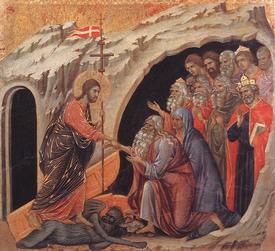There was a day when Nietzsche was right: God was dead, the Word was not heard in the world, the body was interred and the tomb sealed up, the soul descended into the bottomless abyss of Sheol." This descent of Jesus into the kingdom of the dead "was part of his abasement even if (as St. John admits of the Cross) this supreme abasement is already surrounded by the thunderbolts of Easter night. In fact, did not the very descent to hell bring redemption to the souls there?" It prolonged in some manner the cry from the Cross: Why have you abandoned me? "Nobody could ever shout that cry from a deeper abyss than did he whose life was to be perpetually born of the Father."
 But there remains the imitation of Christ. There is a participation, not only sacramental, but contemplative in his mystery. There is an experience of the abandonment on the Cross and the descent into hell, and experience of the poena damni. There is the crushing feeling of the "ever greater dissimilarity" of God in the resemblance, however great, between him and the creature; there is the passage through death and darkness, the stepping through "the somber door". In conformity to the mission he has received, the prayerful man then experiences the feeling that "God is dead for him". And this is a gift of Christian grace -- but one receives it unawares. The lived and felt faith, charity, and hope rise above the soul to an inaccessible place, to God. From then on it is "in nakedness, poverty and humiliation" that the soul cries out to him.
But there remains the imitation of Christ. There is a participation, not only sacramental, but contemplative in his mystery. There is an experience of the abandonment on the Cross and the descent into hell, and experience of the poena damni. There is the crushing feeling of the "ever greater dissimilarity" of God in the resemblance, however great, between him and the creature; there is the passage through death and darkness, the stepping through "the somber door". In conformity to the mission he has received, the prayerful man then experiences the feeling that "God is dead for him". And this is a gift of Christian grace -- but one receives it unawares. The lived and felt faith, charity, and hope rise above the soul to an inaccessible place, to God. From then on it is "in nakedness, poverty and humiliation" that the soul cries out to him.
Those who have experienced such states afterwards, more often than not, in their humility, see nothing in them but a personal purification. True to his doctrine which refuses to separate charisms and gifts of the Holy Spirit, the ecclesial mission, and individual mysticism, von Balthasar discerns in it essentially this "Holy Saturday of contemplation" by which the Betrothed, in some chosen few of her members, is made to participate more closely in the redemption wrought by the Spouse. We have arrived at a time in history when human consciousness, enlarged and deepened by Christianity, inclines more and more to this interpretation.
The somber experience of Holy Saturday is the price to be paid for the dawn of the new spring of hope, this spring which has been "canonized in the rose garden of Lisieux": "is it not the beginning of a new creation? The magic of Holy Saturday ... Deep cave from which the water of life escapes."
Reading so many passages where this theme is taken up, we discern a distress, a solitude, a night -- of the quality, in fact, as that experienced by "the Heart of the world" -- and we understand that a work that communicates so full a joy must have been conceived in that sorrow.
Cardinal Henri de Lubac on the work of Cardinal Hans Urs von Balthasar


Leave a comment